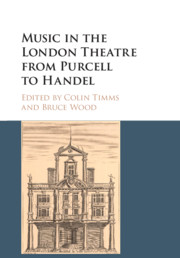Book contents
- Frontmatter
- Contents
- List of Figures
- List of Music Examples
- Notes on Contributors
- Preface
- Introduction
- I FROM PURCELL TO HANDEL
- 1 Purcell's ‘Scurvy’ Poets
- 2 Opera as Literature and the Triumph of Music
- 3 The British Enchanters and George Granville's Theory of Opera
- 4 Lost Chances: Obstacles to English Opera for Purcell and Handel
- 5 Alexander's Feast, or The Power of Perseverance: Dryden's Plan for English Opera and its Near-fulfilment in a Handel Ode
- II HANDEL AND ITALIAN OPERA
- III HANDEL AND ENGLISH WORKS IN THE THEATRE
- Bibliography
- Index
4 - Lost Chances: Obstacles to English Opera for Purcell and Handel
from I - FROM PURCELL TO HANDEL
Published online by Cambridge University Press: 10 June 2017
- Frontmatter
- Contents
- List of Figures
- List of Music Examples
- Notes on Contributors
- Preface
- Introduction
- I FROM PURCELL TO HANDEL
- 1 Purcell's ‘Scurvy’ Poets
- 2 Opera as Literature and the Triumph of Music
- 3 The British Enchanters and George Granville's Theory of Opera
- 4 Lost Chances: Obstacles to English Opera for Purcell and Handel
- 5 Alexander's Feast, or The Power of Perseverance: Dryden's Plan for English Opera and its Near-fulfilment in a Handel Ode
- II HANDEL AND ITALIAN OPERA
- III HANDEL AND ENGLISH WORKS IN THE THEATRE
- Bibliography
- Index
Summary
Given the abundance of wonderful music by Purcell and Handel that sets English poetry, it might seem contrary to harp on missed opportunities, the might-have-beens of stellar collaboration. But when we consider the resistance that had to be overcome for these artistic successes to be realised, we must also assume that Purcell and Handel could have composed many more masterpieces of English musical drama. For Purcell, the main obstacle to full-blown opera in English was the public's devotion to semi-opera or dramatic opera, in which vocal music was segregated from plot-advancing dramatic scenes, thus cutting through the heart of dramma per musica (drama through or for music). For Handel, the main obstacle to English opera was the public's obsession with Italian opera seria. Underlying each of these unequal competitions was a set of beliefs about the relations between music and language that is considered in this chapter.
Introducing the Norton Critical Score of Dido and Aeneas, Curtis Price asserts that ‘not a shred of evidence has ever been produced to show that Purcell was dissatisfied with semi-opera or frustrated at not being able to follow Dido with another through-composed music drama’. But would not our accepting Price's claim that the subsequent dramatic operas ‘include much finer music than Dido: longer-breathed melodies, more sophisticated harmony and counterpoint, and more richly developed characters’ lead us to be dissatisfied, and to regret that Purcell never composed a full-blown opera, one in which his richly developed characters could have figured prominently in the action, and his melodies, harmony and counterpoint served to advance it?
In his biography of Handel, Christopher Hogwood claims that ‘to a modern listener, who can find the emotional conviction of Galatea or Esther as compelling as the dilemmas of Tamerlano or Medea, Handel's addiction to opera seria can seem inexplicable’. We can share Hogwood's consternation yet still recognise that there is an explanation. Handel repeatedly neglected to follow up his early successes in setting English texts, because there was no large public, no market, as there was for opera, which for him was written in Italian.
- Type
- Chapter
- Information
- Music in the London Theatre from Purcell to Handel , pp. 49 - 65Publisher: Cambridge University PressPrint publication year: 2017



